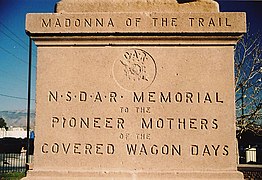| Madonna of the Trail | |
|---|---|
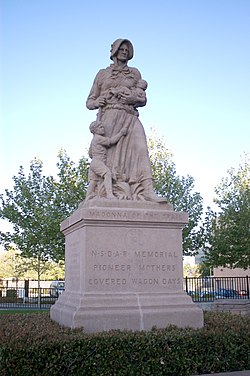 Albuquerque Madonna Albuquerque Madonna | |
| Location | Marble Ave. and 4th St. Albuquerque, New Mexico |
| Built | September 27, 1928 |
| Architect | August Leimbach |
| U.S. National Register of Historic Places | |
| Designated | March 21, 2006 |
| Reference no. | 06000151 |
| Madonna of the Trail California Historical Monument | |
|---|---|
 Madonna of the Trail, 1928 Madonna of the Trail, 1928 | |
| Location | North Euclid Avenue, Upland, California |
| Coordinates | 34°06′26″N 117°39′04″W / 34.1071694°N 117.6512444444°W / 34.1071694; -117.6512444444 |
| Built | 1929 |
| Architect | August Leimbach |
| California Historical Landmark | |
| Designated | November 7, 1998 |
| Reference no. | 1028 |
 | |
Madonna of the Trail is a series of 12 identical monuments dedicated to the spirit of pioneer women in the United States. The monuments were commissioned by the National Society Daughters of the American Revolution (NSDAR) during the administration of President General Grace Lincoln Hall Brosseau. They were installed in each of the 12 states along the National Old Trails Road, which extended from Cumberland, Maryland, to Upland, California.
In 1911, the NSDAR established a committee to honor pioneer women. Initial plans called for painted mileage markers throughout the route. Those plans were later abandoned in favor of pioneer mother statues. Arlene Nichols Moss, NSDAR Commission Chairperson, was inspired by Portland, Oregon’s 1905 "Sacajawea" monument. The NSDAR commissioned sculptor August Leimbach to create the statues. The image is now owned by Kevin Karl, Leimbach's great grandson. Each statue is 10 feet high, weighs 5 tons and is made of Missouri granite. The National Old Trails Road Association (NOTR) was created to study the trails and select routes to designate. Judge (and later U.S. President) led the NOTR and spoke at the first monument dedication in 1928.
The Madonna of the Trail monuments were intended to provide a symbol of the courage and faith of the women whose strength and love aided so greatly in conquering the wilderness and establishing permanent homes. Dedicated in 1928 and 1929, the twelve statues became sources of local pride. Through the continuing efforts of local and national groups, all are currently in good condition and on display.
Map all coordinates using OpenStreetMapDownload coordinates as:
History
Some Madonna of the Trail monuments have become community landmarks.
On June 2, 2020, the Upland, California Madonna of the Trail monument was the site of a Black Lives Matter protest in the wake of the murder of George Floyd.
Locations
There is one monument in each of the 12 states along the National Old Trails Highway (much of which later became U.S. Highway 40 and U.S. Highway 66). The monuments, in order of dedication, are:
| State | Image | Location | Dedicated | Notes |
|---|---|---|---|---|
| Maryland | 
|
Bethesda
Wisconsin Ave. and Old Georgetown Rd. |
Has long been the only one facing east. In December 2004, the statue was temporarily removed to repair its foundation. An alert reporter for the Washington Post noted that as it was placed on the flatbed truck, the Madonna faced west, believed to be the first time all 12 have done so. | |
| Pennsylvania | 
|
Beallsville
US Rt. 40, across from Nemacolin Country Club,12 mi. E of Washington, PA |
||
| West Virginia | 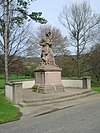
|
Wheeling
US Rt. 40, across from Overlook Condominium |
July 7, 1928 | Contributing structure in the National Road Corridor Historic District |
| Ohio | 
|
Springfield
US Rt. 40 - Snyder's Park. Placed some ten blocks from the National Old Trails Highway |
Ohio's Madonna was moved in 2011 to the new National Road Commons park in downtown Springfield. The statue faces south for better visibility on Main Street (Route 40). | |
| Indiana | 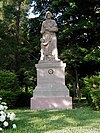
|
Richmond
Glenn Miller Park, US 40 East and N 22 St. |
||
| Illinois | 
|
Vandalia
SE corner of the Old State House |
||
| Missouri | 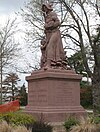
|
Lexington
Main St. and Jack's Ford Rd. |
||
| Kansas | 
|
Council Grove
Union and Main St. |
September 7, 1928 | Listed on the National Register of Historic Places. The Council Grove statue is one of three along the Santa Fe Trail route. Council Grove was chosen for a statue in part due to its historic connections to the trail and in part because the town planned to build a memorial park around the statue. |
| Colorado | 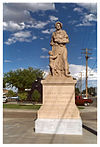
|
Lamar
S Main St. and Beech St. |
||
| New Mexico | 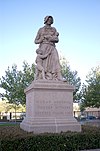
|
Albuquerque
4th and Marble NW |
September 27, 1928 | Listed in the National Register of Historic Places. Originally located in McClellan Park, it was moved in 1996 when the park was demolished to build the Pete V. Domenici United States Courthouse. After restoration work, the monument was installed at the northwest corner of the courthouse grounds, where it was rededicated on September 27, 1998. |
| Arizona | 
|
Springerville
US Rt. 60 (Main St.) across from Post Office |
||
| California | 
|
Upland
Center divider on Euclid Avenue just north of Foothill Boulevard 34°06′26″N 117°39′04″W / 34.1071694°N 117.6512444444°W / 34.1071694; -117.6512444444 |
Marker in Upland reads:
Dedicated in 1929, the Madonna of the Trail is one of twelve identical statues placed in twelve states by the National Society of the Daughters of the American Revolution. The statues, differentiated by the inscriptions on their bases, commemorate the westward move of American civilization on a series of trails, which eventually linked the country from the Atlantic to the Pacific. They especially pay tribute to the importance of a national highway and the role of pioneer women. The statue was designed by German-born architectural sculptor August Leimbach and inspired by a statue of Sacagawea in Portland, Oregon. The Upland monument is said to represent four historic trails: the Mojave Trail, the de Anza Trail, the Emigrant Trail, and the Canyon Road. |
Images
Further reading
- Bauer, Fern Ioula (1984). The Historic Treasure Chest of the Madonna of the Trail Monuments. Springfield, Ohio: J. McEnaney Print. ASIN B0006EG8TM.
- Prescott, Cynthia C. (Summer 2021). Turpie, David C. (ed.). "Myth, Memory, and the Limits of Inclusivity in Arizona Pioneer Monuments". 62 (2). Tucson, AZ: Arizona Historical Society: 173–206. ISSN 0021-9053.
{{cite journal}}: Cite journal requires|journal=(help)
See also
References
- Scauzillo, Steve (June 2, 2020). "Black Lives Matters protesters being met with opposition — a new trend?". Daily Bulletin. Retrieved June 3, 2020.
- Kirby, Doug (May 12, 2006). "Mother Roads: A guide to U.S. mom-uments". NBC News. Retrieved November 13, 2017.
- Barr, Cameron W. (December 11, 2004). "Listing Madonna Rescued in Bethesda". The Washington Post.
- "Dedication of the Madonna of the Trails Monument". Wheeling Daily News. July 7, 1928.
- "Madonna of the Trail". Touring Ohio. Ohio City Productions.
- Spencer, Brenda; Spencer, Michelle (November 1, 2017). "National Register of Historic Places Registration Form: Madonna of the Trail" (PDF). Kansas Historical Society. Retrieved April 23, 2022.
- Sanders, Jeffrey C. (2004). McClellan Park: The Life and Death of an Urban Green Space. Albuquerque: The Albuquerque Museum.
- Steinberg, David (June 26, 1998). "Spirit of pioneer women lives on". Albuquerque Journal. Retrieved May 18, 2018.
- "New Mexico Madonna of the Trail". National Park Service.
- Delja, Beatrice; Delja, Denis. "CHL No. 1028 Madonna of the Trail - San Bernadino". California Historical Landmarks.
External links
Categories:- 1928 sculptures
- 1929 sculptures
- Buildings and structures in Apache County, Arizona
- Buildings and structures in Prowers County, Colorado
- Daughters of the American Revolution monuments and memorials
- Local monuments and memorials in the United States
- Monuments and memorials in Arizona
- Monuments and memorials on the National Register of Historic Places in California
- Monuments and memorials in Colorado
- Monuments and memorials in Illinois
- Monuments and memorials in Indiana
- Monuments and memorials in Kansas
- Monuments and memorials in Maryland
- Monuments and memorials in Missouri
- Monuments and memorials in New Mexico
- Monuments and memorials in Ohio
- Monuments and memorials in Pennsylvania
- Monuments and memorials in West Virginia
- Outdoor sculptures in Arizona
- Outdoor sculptures in California
- Outdoor sculptures in Colorado
- Outdoor sculptures in Illinois
- Outdoor sculptures in Indiana
- Outdoor sculptures in Kansas
- Outdoor sculptures in Maryland
- Outdoor sculptures in Missouri
- Outdoor sculptures in New Mexico
- Outdoor sculptures in Ohio
- Outdoor sculptures in Pennsylvania
- Outdoor sculptures in West Virginia
- Stone sculptures in the United States
- Tourist attractions along U.S. Route 66
- Monuments and memorials to pioneer women
- California Historical Landmarks
- Upland, California
- Buildings and structures in San Bernardino County, California
- Sculptures of children in the United States
- Sculptures of women in the United States
